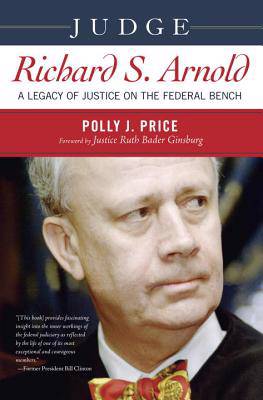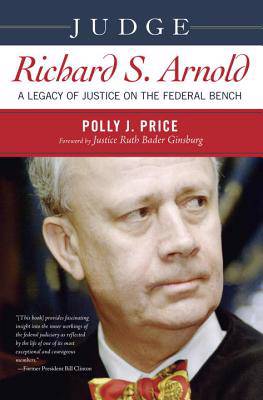
Vous voulez être sûr que vos cadeaux seront sous le sapin de Noël à temps? Nos magasins vous accueillent à bras ouverts. La plupart de nos magasins sont ouverts également les dimanches, vous pouvez vérifier les heures d'ouvertures sur notre site.
- Retrait gratuit dans votre magasin Club
- 7.000.000 titres dans notre catalogue
- Payer en toute sécurité
- Toujours un magasin près de chez vous
Vous voulez être sûr que vos cadeaux seront sous le sapin de Noël à temps? Nos magasins vous accueillent à bras ouverts. La plupart de nos magasins sont ouverts également les dimanches, vous pouvez vérifier les heures d'ouvertures sur notre site.
- Retrait gratuit dans votre magasin Club
- 7.000.0000 titres dans notre catalogue
- Payer en toute sécurité
- Toujours un magasin près de chez vous
Judge Richard S. Arnold
A Legacy of Justice on the Federal Bench
Polly J Price
Livre relié | Anglais
34,95 €
+ 69 points
Description
In 1994, President Bill Clinton called federal appellate court Judge and fellow Arkansan Richard Sheppard Arnold "the most brilliant man on the federal bench." But for concerns about Arnold's poor health, Clinton would have nominated him to fill the vacancy on the Supreme Court left by the retirement of Justice Harry A. Blackmun. Indeed, when the Blackmun position on the court opened up, Arnold received the endorsement of more than 100 federal judges--almost 20 percent of the entire federal judiciary. Clinton's concerns turned out to be well founded, for ten years later Judge Arnold succumbed to the lymphoma that he had battled for almost three decades. At his death, eight Supreme Court Justices published tributes to his fairness, judicial restraint, and eloquent and influential judicial opinions.Who was Richard Arnold, and why did so many colleagues across the political spectrum hold him in such high esteem? In this carefully researched, insightful biography, law professor Polly J. Price, who served as Judge Arnold's law clerk, has created a compelling portrait of a man who, like Judge Learned Hand of an earlier era, is widely believed to be one of the best judges never to serve on the Supreme Court.Through internal court documents, interviews with judges and law clerks, and Arnold's diaries, Professor Price traces Arnold's life, career, and political transformation from an elite Southerner with deep misgivings about Brown v. Board of Education to a modern champion of civil rights. Her analysis of Arnold's leadership in civil rights, especially on First Amendment issues, the death penalty, and claims of individuals against government wrongdoing, tells us much about changes in both southern and national society during his tenure from 1978 to 2004.An important example of Arnold's many contributions was his progressive resolution of desegregation in Little Rock, Arkansas, long infamous for the Central High School crisis of the 1950s. Arnold's work brought closer to an end more than fifty years of federal court supervision of the Little Rock schools.This book also features excerpts from Arnold's diary of his clerkship with Supreme Court Justice William Brennan in 1960. Arnold's diary provides unique insight into this pivotal year of the Warren Court. As much a history of federal courts in recent decades as it is the life story of one of its best-known judges, this first biography of Judge Richard S. Arnold is a sensitively written, objective account of a man of outstanding intelligence, talent, and integrity.
Spécifications
Parties prenantes
- Auteur(s) :
- Editeur:
Contenu
- Nombre de pages :
- 488
- Langue:
- Anglais
Caractéristiques
- EAN:
- 9781591027119
- Date de parution :
- 21-04-09
- Format:
- Livre relié
- Format numérique:
- Ongenaaid / garenloos gebonden
- Dimensions :
- 157 mm x 234 mm
- Poids :
- 789 g







